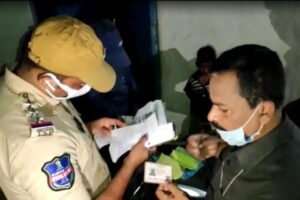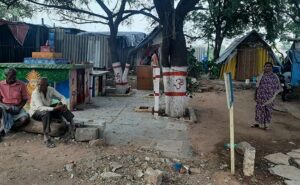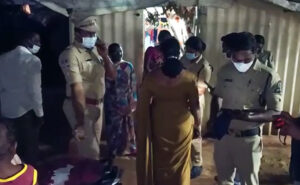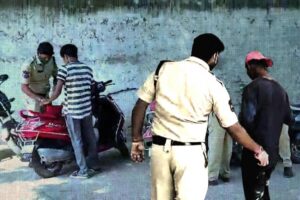The sudden police checking on cordon and search operations (CASO) in various localities in Hyderabad makes unrest in slum dwellers, Innocent daily wages workers, poor and marginalised people. The frequency of CASO is increased with a tight vigil to curb the drugs, crime and anti social elements movements. But the people are getting more worried with the strict police attitude and control.
“They never showed us any warrant before checking our homes. As they are police and as we know we haven’t done anything wrong, we allowed them inside” says Vijay M, a resident of the Chandraiah and Laxmaiah huts located in Malakpet on the banks of Musi River. His house was one amongst 500 homes that were checked as part of the recent cordon and search special drive by Hyderabad police to find contraband and drugs.
 While these search operations have become common in the lower-income communities in the city, the timing of these checks in these slums has left the residents concerned.“In October, there were floods and we lost all our belongings like cylinders, utensils, TV and clothes. In fact, in some places, the entire roof collapsed. Despite that, we rebuilt our homes. But now we hear that Tahsildar’s office is trying to move us to homes allotted for a few families at Munganoor Rajiv Gruha Kalpa. But that location is around 20 km away with no proper water supply and moreover, only a few families were allotted those,” adds Anji, another resident.
While these search operations have become common in the lower-income communities in the city, the timing of these checks in these slums has left the residents concerned.“In October, there were floods and we lost all our belongings like cylinders, utensils, TV and clothes. In fact, in some places, the entire roof collapsed. Despite that, we rebuilt our homes. But now we hear that Tahsildar’s office is trying to move us to homes allotted for a few families at Munganoor Rajiv Gruha Kalpa. But that location is around 20 km away with no proper water supply and moreover, only a few families were allotted those,” adds Anji, another resident.
This anxiety about not being given promised homes, coupled with recent visits of police have added to the confusion on eviction and increased stress on 2000-odd individuals living in the area. “As you know the lockdown has been very difficult with no work. Our women who work as domestic helps were not even allowed to step into the homes. After that, the floods came and took all our belongings and now this check,” lamented another resident. Activists working with affected communities questioned the police on the legality of such cordon and search operations.
The activists say are being carried out without any substantial proof of offence. In the latest operation too, police found no contraband and drugs.“What we are given to understand is that these searches are being carried out under Section 94 of CrPC. But how can such blanket warrants be issued to hold searches across multiple homes? They are randomly entering homes and checking utensils, kirana items and even water bottles,” said SQ Masood, a social activist.
He describes these checks, which were started back in 2012-13, as a “class-based discrimination”. “The homes in Laxmaiah and Chandraiah huts are of SCs, STs and Muslims who are of a lower class, making them easy targets for these checks. On what basis is the police assuming these people handle drugs and after the checks did they find any drugs,” he wondered.
Cordon and search of these huts are not new. They were rocked two years ago when police entered their homes at 1 am, creating panic among the residents. “Two years ago, police did the same thing and checked our homes at 1 am, which left all of us in a state of shock and fear. Compared to that, this time they came at 7 pm when there was public and media so we felt less scared,” said Shivamma, another resident.
 Many persons fear they will be stigmatised in the neighbourhood if the police keep visiting. “We just want to lead decent lives as we did for 30-40 years in the same locality. We have small children at home and we are not able to send them schools due to the lockdown and financial difficulties. Hopefully, this time around we will be given a home in the city and not forced to live here on the banks amidst flooding waters,” added Anji.
Many persons fear they will be stigmatised in the neighbourhood if the police keep visiting. “We just want to lead decent lives as we did for 30-40 years in the same locality. We have small children at home and we are not able to send them schools due to the lockdown and financial difficulties. Hopefully, this time around we will be given a home in the city and not forced to live here on the banks amidst flooding waters,” added Anji.
Meanwhile, legal experts say that while police with a legal warrant can search a house of a suspect, but going after several homes and entering their private space is not justified. “In one cordon and search operation, they found many stolen bikes, which shows that these searches help the society at large. But then there are also cordon and searches that are discriminatory and happen only in disadvantaged communities with no justified suspicion,” explained Karam Komireddy, a lawyer.
Meanwhile, the local police contradicted the claims of locals, saying they did not enter homes and only checked the Musi river bed and bank. “We did not enter any homes and only checked the river bed. We did not search any houses. We only checked the riverside,” said Malakpet SHO K Srinivas.
Hyderabad police’s profile of a ‘junkie’
The police say they are conducting the checks to identify addicts coming to Dhoolpet, known to be a hub for ganja sale, so they can find the source of distribution and end the drug menace.
 The Hyderabad police came under severe scrutiny last month after Excise Department officials along with the Mangalhat police carried out a search operation, frisking motorists randomly in Dhoolpet, and further invading their privacy by checking their phone chats for clues about ganja consumption and smuggling.
The Hyderabad police came under severe scrutiny last month after Excise Department officials along with the Mangalhat police carried out a search operation, frisking motorists randomly in Dhoolpet, and further invading their privacy by checking their phone chats for clues about ganja consumption and smuggling.
Shortly, legal notices were sent to Hyderabad Commissioner Anjani Kumar questioning the legal validity of such extreme measures. Following this, the police have abandoned searching for messages on phones, but the drive to curb the drug menace is continuing intensively.
In the Old City area of Dhoolpet, which has earned the notoriety of being a hub for ganja sale, vigilance has been increased. The Mangalhat police are conducting round-the-clock checks at the entry and exit points of Dhoolpet, where they are nabbing motorists who look ‘suspicious’ and checking their vehicles for drugs.
According to a police officer involved in the drive, it has been a major success. The officer said that as part of the drive, which has been ongoing since October, they look for drug addicts who come to Dhoolpet to buy ganja. “If we can identify the addicts, we can find out the source of distribution and end the menace,” the officer told #KhabarLive.
So how do the police identify addicts? They say they stop anyone who looks out of place in the locality. They look for funky hairstyles, bikes or shoes, anyone who is thin and looking lost. “Searches based on these factors have been highly effective. We have a success rate of 80-90%,” the officer shared.
“It’s over a period of time that we acquire this instinct,” said a top official from the Excise Department who is engaged in the drive against drugs. He added, “We cannot frisk everybody. Then it becomes a mockery.”
The officer said that they study people’s behaviour which helps them in identifying drug addicts. “We’re usually able to identify a suspect – the way he looks, where he is looking at, the way he is dressed, the lane he is taking, where he is stopping, etc.”
Addicts are also profiled based on tattoos, funky shirts or hats. “Not many youngsters come to Dhoolpet. So, we monitor those who come here. Only in some exceptional cases do the addicts look “decent”. Our observation is not mere fluke, it is based on physical appearance and behavioural science.”
According to the officer, vehicle registration is also a give-away. “If a vehicle is not registered in Telangana, then the person comes under surveillance.”
 To describe me: I’m dark, have long curly hair, was wearing a granddad shirt that day that made me look extremely thin, and did not look like I belonged in Dhoolpet.
To describe me: I’m dark, have long curly hair, was wearing a granddad shirt that day that made me look extremely thin, and did not look like I belonged in Dhoolpet.
A local journalist who originally reported about the police invading privacy by going through people’s phones, recalled, “That particular day they were checking almost everyone who was going on a two-wheeler.”
While round-the-clock checks have become the norm under the Mangalhat police jurisdiction, police checks at night time under all police stations in Old City have become a daily routine following a high-level meeting chaired by Chief Minister K Chandrasekhar Rao. In the meeting held on October 20, the CM gave a call for war against drugs. “The usage of ganja is on the increase. There is an urgent need to declare an all-out-war against drug abuse. Before the situation goes out of hand and becomes severe, one should be on alert,” he said.
As part of the routine, the police conduct checks at road junctions from 11 pm. They ask for vehicle documents and anyone unable to produce them is detained for questioning.
Military tactic on civilians
How many Cordon and search ops have Hyderabad cops carried out? What have they found? The data is apparently ‘secret’ — we managed to find some bits.
Around 7.30 pm on October 27, 40-year-old Aruna’s (name changed) makeshift hut located in Hyderabad’s Teegalguda was thrown into pitch darkness. The only lightbulb in the house had fused out. Just when she sent her son to buy a new bulb, around 10 police personnel descended at her doorstep. Initially, Aruna thought the police had come to share details about the houses that the residents were expecting from the government as part of the slum relocation project. It was only a little later that she realised the police had come as part of a cordon and search operation. “Who wouldn’t get scared when so many policemen land up at your house? Even if we haven’t done anything wrong, the sight of police itself causes anxiety,” Aruna said, recounting the incident. “Even the children in the locality were also worried.”
Over 75 police personnel had descended on the settlement to carry out a cordon and search operation — or CASO. “They asked me if we sold ganja, illicit liquor in bottles or gutka. I told them that I am a poor woman who goes to work as a domestic help in houses and works till late in the evening and that I don’t sell any of these things,” recounted Aruna, “I also told them that my husband is no more and that I live with my two children. They then asked for my Aadhaar card and vehicle details. I told them that I don’t own any vehicle. When I asked them angrily why they were asking so many details, they just told me that they were doing their duty and then walked off.”
Though they did not check inside Aruna’s house, the lady constables entered the house adjacent to Aruna’s. They ran their hands through the utensils, looked at the corners, between the clothes, apparently in search of anything suspicious. According to Aruna, around two years ago too, the Hyderabad police had carried out a similar search in the area.
Teegalguda has three main clusters — Chandraiah huts, Hanumanthu huts, and Lakshmamma huts. Altogether there are around 250 huts in this area which is located on the banks of river Musi. The area which falls under the Malakpet police station jurisdiction has mostly people who work as daily wage labourers, garbage collectors, and auto rickshaw drivers.
Cordon and search operation is a controversial military exercise which was first used by the Indian security forces in the early 1990s in the Kashmir Valley. After a pause, it was re-started in 2017. The military uses different kinds of cordon operations — like cordon and knock, or kick, or search. So why is this much criticised operation — which has been termed a human rights violation by the Office of the United Nations High Commissioner for Human Rights — being used in a city like Hyderabad? That too by the local police who cannot even claim they are dealing with terrorists on a daily basis?
Embellished rhetoric vs reality
According to activists who have closely followed Hyderabad police’s cordon and search operations, Hyderabad police first introduced the search operation in 2012. However, from RTI replies received, it seems like the police have records of the operation only from 2015.
#KhabarLive has accessed an internal email sent by Telangana DGP Mahender Reddy to other police officers explaining the purpose of CASO. “The primary purpose is to win the hearts and minds of local communities,” the note said, adding that the police should “keep the local communities on their side by taking them into confidence by explaining the purpose of this exercise — Enhancing Sense of Safety and Security in the Local Communities by preventing outsiders/unsocial elements disturbing peace and safety in the local communities, in addition to explaining all our Technology, Process, People related Initiatives.”
The stated aim looks well-intentioned at first glance, but dig a little deeper and the words mean nothing. The actual operation meanwhile has inspired fear and distrust among the people who are targeted — largely low income and minority communities.
Targeting marginalised and minority communities?
In the first week of November, the Jubilee Hills police carried out a CASO in Filmnagar — which is outwardly affluent, and home to several celebrities and film personalities. But inside Filmnagar is Deen Dayal Nagar, a small slum settlement with around 150 houses, which was the actual target of the police operation. (It is to be noted here that many from the film industry are mired in high profile drug cases, but a raid or CASO in these localities of Filmnagar has never happened.)
Sixty-five-year-old M Bheemaiah, who is the oldest in the slum, was at home when the police personnel turned up in large numbers around 7:30 pm. He was surprised when they landed at his door. “In the last 35 years, this is the first time that the police have come for a search operation in this area. We showed them the documents they asked for. They did not enter any of the houses in our slum as part of their checks. Only vehicle documents and Aadhaar cards were checked,” recounted Bheemaiah.
There is no stated policy which spells out how the police choose areas in which they conduct CASO. According to a senior police officer #KhabarLive spoke to, local police stations identify “crime pockets” based on pending warrants, presence of rowdy sheeters, criminal history, etc. Based on this, the Station House Officers decide locations.
In Teegalguda for example, the police claimed that they carried out CASO as the Telangana government has given them instructions that ganja and other contraband substances should be eliminated. The police found no ganja here, instead they seized 18 two wheelers, five autos and one trolley for not having valid documents or having pending challans. In a few days, all these vehicles were released after challans were paid.
Over the years, activists in Hyderabad and other districts have pointed out that CASOs are carried out in places where low income groups live or to target minorities like Muslims.
SQ Masood, a Hyderabad-based social activist is of the opinion that CASO has become a class issue. “These CASOs are happening in slums where poor and illiterate people reside. These are people who can’t really question the police. This is an issue about class. The raids that are carried out across the state are only in slums and neighbourhoods where the poor reside,” said Masood.
The police however insist that CASO is legal and an important exercise to monitor law and order in the city.
Using Section 93 of the Criminal Procedure Code
Cordon and search operations are carried out in localities by cordoning off all exit points and entry points into the locality. While one team guards the outer boundary, another massive team is deployed to knock on every door and to check the identity of the people residing in the colony. The police pre-plan the entire operation and use maps of the locality to decide how to deploy the personnel, and also to ensure no one enters or leaves the locality during the search.
Rachakonda Commissioner Mahesh Bhagwat told #KhabarLive that a CASO is carried out only after a search warrant is issued. “As per section 20 of the Code of Criminal Procedure (CrPc) of 1973, the Police Commissioner is also the district additional magistrate. According to 93 CrPc, the Commissioner can issue a warrant for a cordon and search operation. Usually, a prior written permission is submitted by the concerned Station House Officer, mentioning clearly why a CASO needs to be carried out and in which area. Based on the request, a warrant is issued by the Commissioner.”
During a CASO, additional staff are allocated for the operation. Along with the local police station staff, there are additional women personnel, officers from the excise department, traffic department and other relevant departments. Until a few years ago, CASOs used to be carried out late in the night or early in the morning. The reason, according to the police: ‘so that criminals are at home during the operation.’
However, now the timings of the operation have changed, apparently in an effort to become more humane. It is either carried out early in the evening and completed by night, or is carried out in the morning.
Speaking to #KhabarLive, LB Nagar inspector Ashok Reddy explained in detail the procedure of a CASO. He said, “We have details about how many houses are there in a locality. Based on the maps, we divide the area and send out multiple teams. We knock on the doors of people and ask for ID proofs and vehicle documents. We also collect details like house number, number of residents, phone number, occupation, vehicle details, etc. We check their Aadhaar card or any ID proof and vehicle documents.”
A senior officer in the system revealed to #KhabarLive that the Telangana DGP is very particular about CASOs. “There are 12 functional verticals based on which a police station is graded. Crime is one of the twelve verticals. Under crime, one of the factors considered is the number of cordon and search operations carried out. Each police station is given a target. This is not just in Hyderabad but in the districts too. We take a warrant before each CASO. Big districts are expected to carry out around 10 CASOs in a month, while smaller districts organise around five,” explained the senior official.
The police personnel have been issued clear directives about what can be done and what shouldn’t be done by the personnel during a CASO. “In houses with women, we ensure the presence of women constables. We have also been directed to avoid loose talk and just carry out the search and proceed,” said Ashok Reddy.
Lawyers and other experts #KhabarLive spoke to say that the use of CrPC 93 itself is questionable. Public interest judicial activist T Dhangopal Rao said, “That section is exclusively used when someone has been served a summons under section 91 of CrPc and there is disobedience. If there is disobedience then enforcement can be done.”
“I don’t think any magistrate will issue a warrant to cordon off an entire colony and search overnight.
Moreover, there is a specific provision in law which states that they cannot be disturbed from evening 6 to morning 6. These CASOs are carried out in the middle of the night. I don’t have an idea if a warrant can be issued to search an entire colony,” he said. “When my PIL was being heard too, the Additional Advocate General who deposed could not elaborate about this.”
In 2014, Dhangopal had filed a Public Interest Litigation in the Hyderabad High Court against the CASOs. The High Court directed Dhangopal to approach the Cyberabad and Hyderabad police commissioners with his grievance. Within a month of the HC order, Dhangopal wrote to both the commissioners regarding his grievance but did not hear back from them.
A senior police officer who has served in Hyderabad and other districts showed #KhabarLive a warrant issued under Section 93 of CrPC to conduct CASO in an area. It is however not clear if warrants are issued each time. SQ Masood said that the police version that warrants are taken each time is hard to believe. Both he and Dhangopal say that even if warrants are issued, CASO is illegal.
“Warrants are issued to search a specific place under specific circumstances. The police cannot issue a warrant for a blanket search. In specific cases wherein a terror suspect is holed up somewhere and they have credible inputs, then the police can exercise their powers to carry out a CASO even without a warrant being issued,” Masood said.
There is reason for Masood’s skepticism. In 2020, he filed an RTI to find out how many CASOs the Hyderabad police had carried out since 2012. He asked for details of the number of police deployed in each CASO and the details of the cases booked in each CASO. But he was stonewalled.
Cops don’t want to share data
Stations in the North zone, East zone and West zone refused to reveal the details requested by Masood citing security concerns. They responded saying as per 8(1)(j)(g) of the RTI Act they are allowed to refuse details regarding issues of security. Masood requested details from 60 law and order police stations in Hyderabad, but only seven police stations in the South zone partially revealed details.
From these limited details, it was found that between 2015 and 2019, around 5,000 police personnel were deployed for CASOs. Thirteen CASOs were organised by the Rein Bazar police station; nine by Moghalpura police station; seven by Mirchowk; two by Dabeerpura; two by Goshamahal; seven by Kalapathar; and one by Nampally police station respectively. Out of these 41 CASOs, only 25 cases were booked by the police, for offences like food adulteration, child labour, polluting the environment, theft, rash acts endangering life, and a case under 25(1A) of Arms Act for possession of prohibited arms and ammunition.
“After I received the replies, I appealed to the State Information Commission stating that I had requested details of cases booked, and the data requested is not related to security concerns and hence doesn’t fall under the 8(j)(g) of the RTI Act. The appeal has been pending ever since with the commission,” Masood said.
‘The people want it.’ But which people?
On October 31, the Uppal police tweeted claiming people in their station limits were requesting for cordon and search operations (CASO) to be carried out. The tweet said that the police were glad to receive such requests from the public. The tweet also assured that CASO would be carried out in colonies soon.
A lot of people found the tweet mysterious and wondered who really would request the police for a CASO in their locality and expressed their shock.
Hoping to find out who the people requesting for CASOs in their localities are, #KhabarLive contacted R Govinda Reddy, Inspector of Uppal police station. He had no clear answers.
This is what Masood faced too. Many police stations responded to him saying they carry out CASOs as part of community policing and to solve the issues of the locals. The Gandhi Nagar police station said CASOs were meant for preventing illegal transactions and for checking fake registration of vehicles. Faluknama police station stated that the information sought would cause invasion of privacy of the individuals. Masood said this is an irony as CASOs itself are an invasion of privacy.
Fighting crime vs fighting for privacy
According to the police, CASOs help in identifying crimes and criminals. In previous CASOs, they have found people indulging in illegal LPG sales, illicit liquor business, selling gutka and other banned substances, stolen vehicles being used, child labour, forced sex work, houses used as commercial establishments, foreigners residing as tenants without necessary documents, and undocumented Bangladeshi nationals. However, during this exercise, the police collect a lot of personal information.
“We check inside the houses if we find anything suspicious while interacting with the people staying in a house; we also check their phones or laptops, if necessary. By entering their vehicle number, we check for pending challans too. We cross verify fingerprints with those on the database on a software called Papillon. The fingerprints of those convicted earlier can be found on the database. We also check previous criminal records by entering their Aadhaar number and phone number. The database has all details of those with a criminal history,” one inspector told #KhabarLive.
However, due to contrary statements from officers, it is not clear whether fingerprints are collected from all citizens in all areas and whether they are stored. In Malakpet and Deen Dayal Nagar, people told #KhabarLive that their fingerprints had not been collected.
Many legal experts #KhabarLive spoke to have mentioned the Kharak Singh case, which dates back to 1962, and highlights the issue of state surveillance versus the right to privacy. Kharak Singh, who lived in Uttar Pradesh, was let off in a dacoity case due to lack of evidence. However, when police authorities continued their regular surveillance, he challenged it on the grounds of infringement of his constitutionally guaranteed fundamental rights. Kharak Singh filed a writ petition before the Supreme Court challenging the Uttar Pradesh police’s secret picketing of his house, domiciliary visits at night, periodic inquiries by officers and tracking of his movements.
In a majority judgment, the apex court struck down domiciliary visits as unconstitutional. Justice Subbarao held that all surveillance measures were unconstitutional, but ruled that “privacy was not a guaranteed constitutional right.”
This judgment came up again in 2017, during the landmark case of Justice KS Puttaswamy vs Union of India. A nine-judge bench of the Supreme Court delivered a unanimous verdict and said that the Constitution of India guarantees to each individual a fundamental right to privacy. This judgment overruled the privacy part of the Kharak Singh judgment and declared that privacy is a fundamental right.
If one goes by the two judgments, the Hyderabad police’s CASO is not only unconstitutional as mentioned in the Kharak Singh case, it is also a blatant violation of the right to privacy which is now a fundamental right.
MA Shakeel, a lawyer who works closely with human rights violation cases, asserted that CASOs have to stop. “Not only do they intrude into one’s privacy, it’s also humiliating in the community when one’s house is searched by police in the middle of the night. Most times, it is Muslim communities and the marginalised that are the target. CASOs are not really a consequence of a failed law and order situation. CASOs are to intimidate people and to keep them under control. What the police call visible policing is also the same — a process to keep people living under fear. The intimidation helps the police keep a check on the people,” he said. #KhabarLive #hydnews







